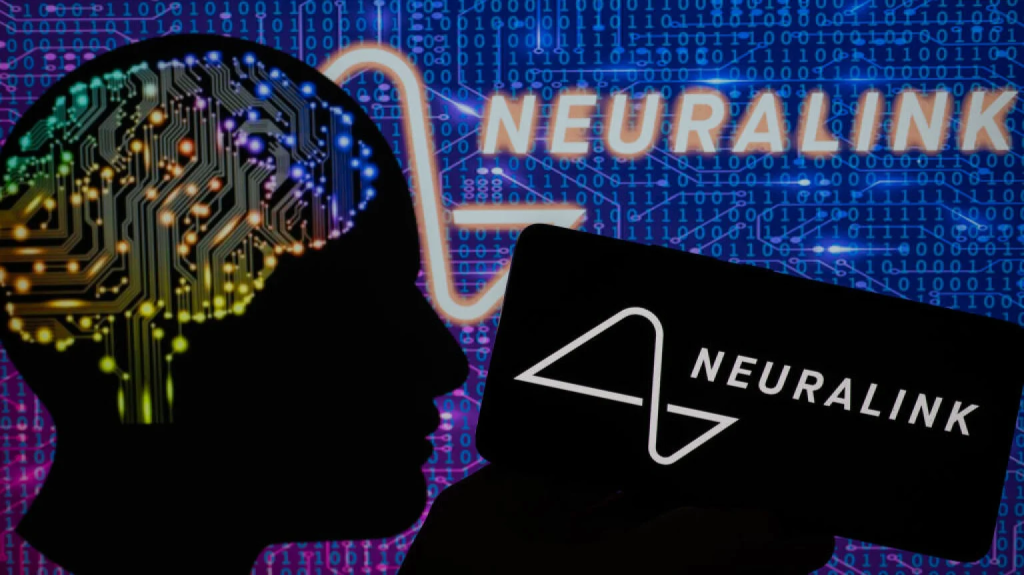Neuralink Achieves Milestone with Successful Brain Chip Implantation in First Human
Elon Musk, the visionary entrepreneur, announced a groundbreaking achievement from his biotech company, Neuralink. For the first time, Neuralink has successfully implanted one of its brain chips in a human, with Elon Musk describing the early results as “promising.” The recipient is reported to be in good condition following the surgery.
The primary objective of Neuralink is to develop an advanced brain-machine interface that enables individuals to control devices using their brain activity alone. Elon Musk revealed this significant development in a post on his social media platform, X (formerly Twitter), on Monday evening. According to Musk, the “first human received an implant from Neuralink yesterday and is recovering well.”

While Musk provided limited details about the procedure, he mentioned that the initial results included “promising neuron spike detection.” This refers to the ability to detect signals from brain cells that transmit chemical and electrical impulses throughout the body.
Neuralink’s ambitious goals involve creating a “fully-implantable, wireless brain-computer interface” that could revolutionize treatments for individuals facing various disabilities, including paralysis. The company’s first human trial, known as PRIME (Precise Robotically Implanted Brain-Computer Interface), aims to use the R1 Robot to surgically implant the chip in a brain region controlling motor function. The implanted chip is designed to “record and transmit brain signals wirelessly to an app that decodes movement intention.”
Neuralink’s trial received approval from the US Food and Drug Administration (FDA) in May of last year, overcoming previous allegations of “animal-welfare violations” during earlier tests. Musk has expressed optimism that the brain implant could potentially restore sight to the blind, among other medical advancements.
Despite the groundbreaking nature of the achievement, the company has faced scrutiny over allegations of pushing researchers to “accelerate development,” leading to concerns about experimental mishaps. Elon Musk has previously showcased the capabilities of the brain chip, including a demonstration in April 2021 where a macaque monkey purportedly played a video game using its mind alone.

Elon Musk and Neuralink: Pioneering the Future of Brain-Machine Interfaces
Elon Musk, the tech entrepreneur known for his ambitious ventures, has once again captured the world’s attention with Neuralink, a neurotechnology company aiming to revolutionize the interaction between the human brain and machines. This article delves into the history of Elon Musk and the inception and development of Neuralink.
Elon Musk: A Visionary Entrepreneur:
Elon Musk’s journey as an entrepreneur has been marked by a series of groundbreaking ventures. Co-founder of PayPal, Tesla, and SpaceX, Musk has consistently demonstrated his commitment to pushing the boundaries of technology. Neuralink, founded in 2016, is Musk’s foray into the complex and promising realm of neurotechnology.
The Birth of Neuralink:
Neuralink Corporation was officially founded by Elon Musk and several other co-founders in July 2016. The company’s mission is to develop brain-machine interface (BMI) technologies that enable direct communication between the human brain and external devices. Musk’s vision involves enhancing human capabilities, addressing neurological disorders, and, ultimately, achieving symbiosis with artificial intelligence.
Early Objectives and Goals:
In the early stages, Neuralink set ambitious goals centered around creating devices that could be implanted into the brain to enable direct communication with computers and other external devices. Musk aimed to bridge the gap between the human brain and artificial intelligence, envisioning a future where individuals could seamlessly interact with technology using their thoughts.
Technological Challenges and Breakthroughs:
The journey for Neuralink has not been without challenges. Developing safe and effective brain-machine interfaces requires overcoming significant technological hurdles. Neuralink’s researchers have been tasked with creating devices capable of accurately interpreting and transmitting signals from the brain while ensuring minimal invasiveness.
Public Unveiling and Demonstrations:
Neuralink gained widespread attention in 2019 when Elon Musk presented the company’s progress and vision during a live-streamed event. Musk showcased the development of the Neuralink device, a small computer chip designed to be implanted into the brain. The event included a demonstration featuring pigs with implanted Neuralink devices, highlighting the potential for real-time monitoring of neural activity.
Human Trials and Regulatory Approval:
In 2020, Neuralink received approval from the US Food and Drug Administration (FDA) to conduct human trials. The approval marked a significant milestone for the company, allowing it to move forward with testing its brain-machine interface technology in human subjects.
Recent Achievements and the Future:
Elon Musk announced in 2022 that Neuralink had successfully implanted brain chips in monkeys, enabling them to play video games using their thoughts. The recent milestone of implanting a Neuralink device in a human, as disclosed by Musk, represents a crucial step forward in the company’s quest to develop advanced brain-machine interfaces.
Elon Musk’s Neuralink stands at the forefront of neurotechnology, with its ambitious goals and recent achievements capturing the imagination of the tech world. As the company continues its journey, the world eagerly awaits the potential transformative impact Neuralink may have on the future of human-machine interactions and medical treatments.
The development and use of brain chips, or brain-machine interface (BMI) technologies, raise various ethical and legal considerations. As these technologies advance, it becomes essential to address the potential impact on individuals, society, and privacy. Here are some key ethical and legal considerations associated with brain chips:
Ethical Considerations:
- Privacy:
- Concern: Brain data is highly personal. The collection and sharing of neural information raise concerns about privacy, consent, and the potential for unauthorized access.
- Informed Consent:
- Concern: Individuals must fully understand the risks and implications of brain chip implantation. Informed consent becomes crucial, especially considering the long-term effects and potential unknowns.
- Autonomy and Agency:
- Concern: Brain chips have the potential to influence or control an individual’s thoughts and actions. Preserving autonomy and preventing undue influence are ethical imperatives.
- Equity and Access:
- Concern: There’s a risk that brain chip technologies may create disparities if access is limited to certain groups. Ensuring equitable access and benefits is an ethical consideration.
- Security:
- Concern: Brain-machine interfaces could be vulnerable to hacking or unauthorized access. Ensuring the security of neural data and preventing malicious use is an ethical imperative.
- Long-Term Effects:
- Concern: The long-term effects of brain chip implantation are not fully understood. Ethical considerations involve monitoring individuals for potential risks and addressing unforeseen consequences.
Legal Considerations:
- Consent Laws:
- Consideration: Legal frameworks must address the requirements for obtaining informed consent for brain chip procedures, ensuring individuals understand the nature and potential risks.
- Data Protection and Privacy Laws:
- Consideration: Existing data protection and privacy laws may need to be adapted to cover neural data. Legal safeguards are necessary to protect individuals from unauthorized access and use of their brain data.
- Security Regulations:
- Consideration: Laws and regulations should address the security of brain-machine interfaces to prevent hacking or other cybersecurity threats that could compromise user safety.
- Anti-Discrimination Laws:
- Consideration: Legal frameworks should prevent discrimination based on the use or non-use of brain chip technologies. Protections against unfair treatment in employment, education, or other contexts are essential.
- Ownership and Control of Data:
- Consideration: Laws should clarify the ownership and control of neural data. Individuals should have rights over how their brain data is used, shared, and stored.
- Liability and Accountability:
- Consideration: Legal frameworks need to establish liability and accountability in cases of malfunction, unintended consequences, or misuse of brain chip technologies.
- Regulation of Research and Development:
- Consideration: Governments may need to establish regulations governing the research, development, and testing of brain-machine interfaces to ensure ethical standards and safety.
Addressing these ethical and legal considerations is crucial to fostering responsible development and deployment of brain chip technologies, balancing innovation with the protection of individuals’ rights and well-being.
Brain chips, or brain-machine interfaces (BMIs), have the potential to bring about transformative changes in various aspects of human life. While the ethical, social, and technical challenges need careful consideration, here are some ways in which brain chips could impact the future of humanity:
- Enhanced Cognitive Abilities:
- Potential Impact: Brain chips could augment cognitive functions, enhancing memory, learning capabilities, and problem-solving skills. This could lead to a new era of intellectual capabilities for individuals.
- Medical Treatments and Rehabilitation:
- Potential Impact: Brain chips offer promising avenues for treating neurological disorders and injuries. They could facilitate neurorehabilitation, restore lost functions, and improve the quality of life for individuals with conditions like paralysis or brain injuries.
- Communication and Control:
- Potential Impact: Brain-machine interfaces could revolutionize communication by enabling direct brain-to-device interactions. Individuals with mobility impairments may gain more control over computers, prosthetics, or assistive devices through neural signals.
- Sensory Augmentation:
- Potential Impact: Brain chips could provide a means to enhance or restore sensory perceptions. This could include devices that enable the blind to “see” through sensory substitution or enhance hearing abilities.
- Mental Health Interventions:
- Potential Impact: Brain chips might offer new avenues for treating mental health conditions. By modulating neural activity, they could potentially address conditions like depression, anxiety, or PTSD.
- Education and Learning Acceleration:
- Potential Impact: Brain chips could facilitate faster learning and skill acquisition. They may enable direct knowledge transfer, potentially changing the landscape of education and training.
- Human-Machine Integration:
- Potential Impact: Seamless integration with machines could redefine how humans interact with technology. This integration might lead to a more symbiotic relationship between humans and machines, allowing for more intuitive and efficient collaborations.
- Memory Enhancement:
- Potential Impact: Brain chips could enhance memory retention and recall. Individuals might have the ability to store and retrieve vast amounts of information with greater accuracy.
- Entertainment and Virtual Reality:
- Potential Impact: Brain-machine interfaces could revolutionize entertainment experiences. Virtual reality and immersive gaming could reach new levels of realism by directly interfacing with the brain’s sensory and motor systems.
- Ethical and Philosophical Considerations:
- Potential Impact: The advent of brain chips raises profound ethical and philosophical questions about identity, autonomy, and what it means to be human. Society may need to grapple with defining ethical norms and boundaries in the context of neural enhancements.
- Global Connectivity:
- Potential Impact: Brain chips might contribute to a more connected global society. Direct brain-to-brain communication could transcend language barriers and foster a deeper understanding among individuals from diverse cultures.
- Economic and Social Inequality:
- Potential Impact: If brain chip technologies are not universally accessible, they could exacerbate existing inequalities. Addressing issues of affordability and equitable access will be crucial for preventing disparities.
While the potential benefits are exciting, it is essential to approach the development and deployment of brain chips with caution, considering ethical, privacy, and safety considerations to ensure that the transformative impact is positive for humanity as a whole.
Shayne Heffernan









